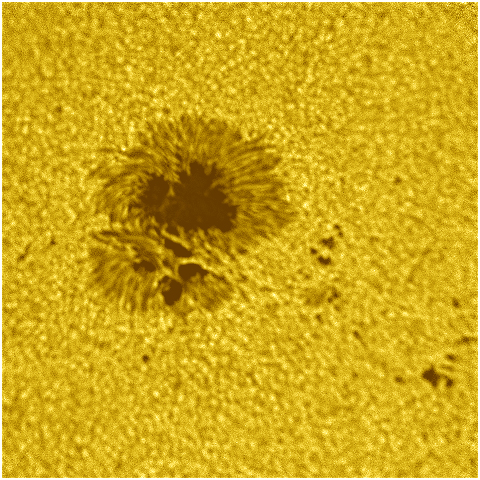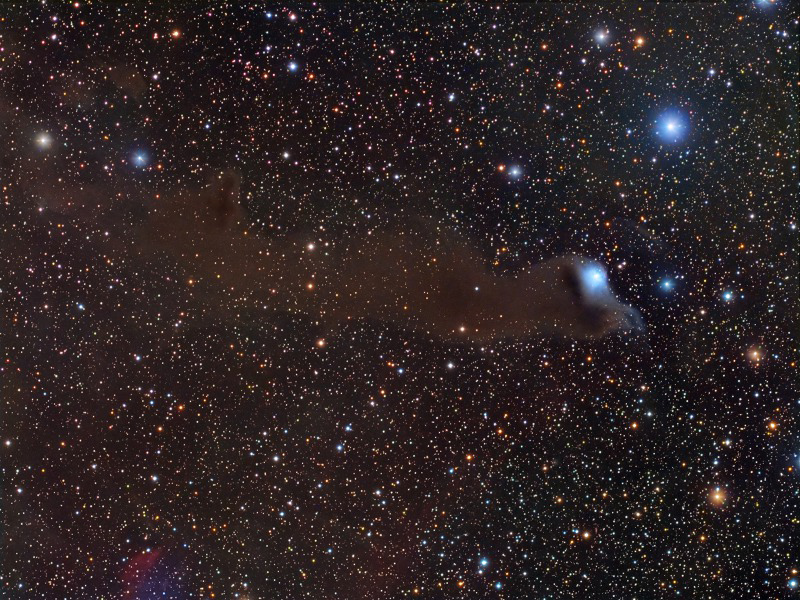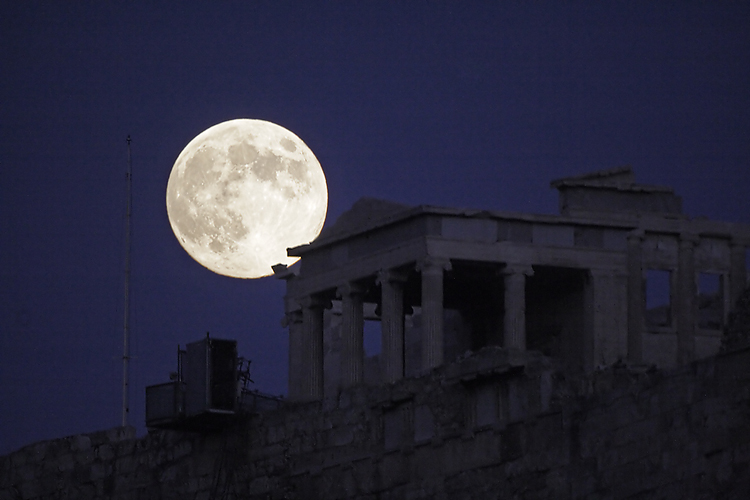Page 8 of 12
Re: Submissions: 2013 August
Posted: Mon Aug 19, 2013 1:37 am
by Ann
geckzilla wrote:Sandgirl wrote:Nova Delphini Spectrum
Copyrights: Juerg Alean
Is this a fairly typical way of presenting spectrums? I've never seen it like this before. I really like this. The Hubble people wanted everyone to pick their favorite Hubble images and even told us to pick our favorite spectrums but the presentation of spectrums is so... well, it's scientific, which has a beauty if you know how to appreciate it, but I can't help but try to think of ways to make them more easily understandable by the average Joe.
The picture is indeed extremely informative!

These are a few things we can learn from it:
1) We can see the relative position of Nova Delphini compared with other stars whose position we can find in the Hipparcos catalog. For example, we can see that Nova Delphini is located close to star HIP 100536.
2) We can compare the brightness of Nova Delphini with the brightness of other stars in the vicinity.
3) We can get an idea of the relative brightness of stars that are one, two or three magnitudes brighter or fainter than other stars. We can see, for example, that Nova Delphini is
much brighter than eighth magnitude star HIP 100536 right next to it. We can see that the only star in the field whose brightness is in any way comparable to Nova Delphini is HIP 100754, whose V magnitude is 5.65. Clearly Nova Delphini is brighter than than HIP 100754, however.
4) We can get an idea of the colors of the stars. At upper right in the picture we can see two stars, blue HIP 100425 and red HIP 100346. These two stars are fairly similar in V (green) magnitude. We can clearly see, however, that the red part of the spectrum is brighter in red star HIP 100346 than in blue star HIP 100425. Still more remarkable is that we can see a lot of blue light from blue star HIP 100425, whereas the blue part of the spectrum is all but missing from red star HIP 100346.
5) We can check out the greenish color of OIII emission from planetary nebula NGC 6905.
6) We can see that all the colors of the spectrum are quite bright in Nova Delphini. Therefore its overall color should be fairly neutral. However, the blue part of the spectrum is so bright that Nova Delphini is certainly bluer than the Sun in this picture.
7) We can see a few obvious spectral lines in Nova Delphini, but not very many. Some of the lines appear to be hydrogen absorption lines from the
Balmer series.
8) We can see that there appear to be bright emission lines right next to the dark absorption lines. Nova Delphini therefore appears to have a P Cygni spectrum, where dark absorption lines are bordered (on the red side) by bright emission lines. This feature means that we are looking at ejecta coming our way, or, in other words, we are looking at fragments from an explosion.
So the picture is indeed highly informative!

Ann
Re: Submissions: 2013 August
Posted: Mon Aug 19, 2013 4:09 am
by f.lorand
Centaurus A widefield
http://www.pleiades.hu/en/index.php
Copyright: Lóránd Fényes
HI-RES version:
http://www.pleiades.hu/en/galeria/kozmo ... mal/62.jpg
8" newton (home made)
SkyWatcher EQ-6
Canon EOS600D
35 x 6min ISO 800
Namibia
01.04.2013
Re: Submissions: 2013 August
Posted: Mon Aug 19, 2013 7:13 am
by Jaskagidaskaja
The kids came running in: "Dad, there's a rainbow around the sun!"
It was amazing to see an actual live halo. Must remember to look at the sun more regularly.

Re: Submissions: 2013 August
Posted: Mon Aug 19, 2013 8:30 am
by ViliMax
vdB 141 (Sh2-136) - Reflection Nebula in Cepheus
http://www.irida-observatory.org
Copyright: [url=mailto://
info@irida-observatory.org]
Velimir Popov, Emil Ivanov[/url]
VdB 141 (also known as Sh2-136) is a reflection nebula joint in an emission nebula in the constellation of Cepheus. It is catalogued by Sidney van den Bergh in 1966 and it is often referred to as the Ghost Nebula due to several human-like figures with arms raised. Illuminating the nebula is a star still in the formation process identified as BD+67 1300 and is of type FU Orionis which is quite rare and exhibits very unusual brightening and dimming behavior.
Higher resolution, and more images and information is avaliable
here ... or
here ...
Thank you for looking ...
http://www.irida-observatory.org
Copyright: [url=mailto://
info@irida-observatory.org]
Velimir Popov, Emil Ivanov[/url]
Aug 17 2013 Sun 3 Spot AR1818
Posted: Mon Aug 19, 2013 2:46 pm
by Andromeda 2013
I am an amateur Astronomer/Astrophotographer who started about a year ago, I have learned from the net and from trial and error; I am posting here a photo that I am proud of. I used a Celestron C-11 Edge HD on a CGM-DX mount, the camera is an imaging source 21au618as mono CCD camera, the image is stacked in Registax 5 using short 1 minute captures at 60 frames per second and colorized in Photoshop.
Kendrick Solar filter on the C-11 and a combination of filters on the camera, Continuum, IR/UV cut, and polarizing.
I have been trying for a year now to bring out the Penumbra in detail and finally have done that.
Any tips appreciated.
Re: Submissions: 2013 August
Posted: Mon Aug 19, 2013 3:15 pm
by Andromada 2013
I am an amateur Astronomer/Astrophotographer who started about a year ago, I have learned from the net and from trial and error; I am posting here a photo that I am proud of.
I used a Celestron C-11 Edge HD on a CGM-DX mount, the camera is an imaging source 21au618as mono CCD camera, the image is stacked in Registax 5 using short 1 minute captures at 60 frames per second and colorized in Photoshop.
Kendrick Solar filter on the C-11 and a combination of filters on the camera, Continuum, IR/UV cut, and polarizing.
I have been trying for a year now to bring out the Penumbra in detail and finally have done that.
Nova Delphini 2013 & NGC6905
Posted: Tue Aug 20, 2013 1:49 am
by Efrain Morales
Nova Delphini 2013 on August 18th, 01:29ut. Slightly brighter from my last observation holding presently at 4.8-5.2 mag. A nova (plural novae or novas) is a cataclysmic nuclear explosion in a white dwarf star. It is caused by the accretion of hydrogen on to the surface of the star, which ignites and starts nuclear fusion in a runaway manner. And on the same region close by is the Planetary Nebula NGC6905 on August 18th,03:52ut. Planetary Nebula NGC6905 has an expanding shell of thin ionized gas that is ejected from this dying star of about the same mass as the sun, the gas absorbs ultraviolet radiation from the central star and reemits it as visible light by the process of fluorescence.
(Equipment: LX200ACF 12 in. OTA, F6.3, CGE mount, ST402me NAB Ccd, Astronomik LRGB filter set.)
Re: Submissions: 2013 August
Posted: Tue Aug 20, 2013 3:57 am
by ftherrmann
National Geographic Writeup of the Rosette
http://fth.bounceme.net/
Copyright: Fred Herrmann, All rights reserved 2013
Please see article at:
http://tinyurl.com/RosetteFTH2013
Re: Submissions: 2013 August
Posted: Tue Aug 20, 2013 4:00 am
by ftherrmann
National Geographic Writeup of the Dumbbell
http://fth.bounceme.net/
Copyright: Fred Herrmann, Terry Hancock, Andre Van Der Hoeven, All rights reserved 2013
Please see article at:
http://news.nationalgeographic.com/news ... 00x450.jpg
Re: Submissions: 2013 August
Posted: Tue Aug 20, 2013 8:42 am
by StefanoDeRosa
Man on a man on the Moon
http://stefanoderosa.com/
Copyright: Stefano De Rosa
Please find attached two images taken from Isola d'Elba (Italy) on August 18, 2013
Best regards
Stefano
Jumping to the Moon
http://stefanoderosa.com/
Copyright: Stefano De Rosa
Re: Submissions: 2013 August
Posted: Tue Aug 20, 2013 10:55 am
by Bi2L
Four Moons, three colours, two difference distances
We have all heard numerous times of the Supermoon, the largest or more beautiful Full Moon of the year and sometimes we have also heard of the smallest Full Moon of the year and the blood-red moon. In the above picture we can see examples of all three aforementioned Moons. The Moons were shot with the same telescope (SW ED 80) and camera (Canon EOS 30D) and one can compare their sizes to find the Moon’s distance from the Earth. The bottom right Moon has been captured with different equipment and its size cannot be compared to that of the other Moons.
The first Moon (top left) is a rising August Moon near the lighthouse of Corfu’s Old Fortress and lies at the farthest point from the Earth, called apogee and measuring 406,000 kms.
The second Moon, touching the walls of the New Fortress at first sight looks like an average Moon but is in fact closer to being a Supermoon, since at a 362,000 kms distance, it is close to the perigee. However, in this picture the Moons doesn’t look big because the clouds have distorted the Moon’s image, making it look smaller. Nonetheless, this July Moon is most impressive because its colour was the most intense red I have ever captured. It is usually the August moon that has the reputation of being impressively coloured but it all comes down to luck since all summer moons can have this wonderful colour, provided that there is dust, humidity and bad seeing. In general, summer moons are more beautiful than winter moons due to the ecliptical axis’ elevation during the night.
The third moon is a real Supermoon at the perigee at 354,000 kms distance. The photo was taken when the moon has risen high enough, in order to ensure that the image would not be distorted. At this height it lost its striking colour but nevertheless gave us its amazing dazzling light, turning night into day.
The fourth moon (bottom right) is a blood-red moon, as Earth has hidden the Sun and doesn’t let sunrays reach our natural satellite. The distortion of light at the sides of the Earth bends the sunrays, creating a phenomenon similar to that of a moonrise due to light scattering and thus giving the moon its blood-red colourm, which is actually the colour the moon has during an eclipse.
Images 1,2,3 : SW ED80 Canon eos 30D 600mm f7.5 iso100 Image
4: Canon eos 40D EF 100-400 is usm 400mm resize iso400
Re: Submissions: 2013 August
Posted: Tue Aug 20, 2013 3:04 pm
by MaPa
VdB152 in Cepheus
Copyright: Marcin Paciorek
This is reprocessed version of old but very good material.
http://astromarcin.pl/pages/vdb152.html
http://www.astromarcin.pl/images/nebula ... 2_1600.jpg
Re: Submissions: 2013 August
Posted: Tue Aug 20, 2013 7:36 pm
by Sandgirl
Centaurus A widefield
Copyrights: Fényes Lóránd
Sun H-alpha August 18, 2013. Activity in southern hemisphere
Copyrights: Oliver Hardy
IC1274
Copyrights: Randall Pugh
Veil Nebula
Copyrights: Peter Delincak
NGC 6302 - Bug Nebula
Copyrights: Martin Pugh
Re: Submissions: 2013 August
Posted: Tue Aug 20, 2013 8:03 pm
by Sandgirl
Zenith of the Northern Summer Sky
Copyrights: Leonardo Orazi
Waking Up to a New Year on Planet that Orbits Star Every 8.5 Hours
Image credits: Christina Sanchis Ojeda
More about:
http://web.mit.edu/newsoffice/2013/kepl ... -0819.html
Double rainbow
Copyrights: Göran Strand
Orion
Copyrights: Salvatore Spinoso
ISS and the Sun
Copyrights: Hubert Drozdz
The Pipe Nebula
Copyrights: Luis Argerich
Re: Submissions: 2013 August
Posted: Tue Aug 20, 2013 8:11 pm
by Sergio
NGC 6823, Sh 2-86 and 6820 in Vulpecula
Open Cluster NGC 6823 is surrounded by emission nebula complex Sh 2-86 in the northern constellation of Vulpecula. The nebula presents a pillar of dust and gas in the east side of the cluster. The mentioned pillar might got its shape from the radiation coming from young stars nearby. The central open cluster NGC 6823 has only 2 million years old and it covers a distance of 50 million light years. With large aperture telescopes it can be seen approximately fifty stars including the four magnitude 9 to 11.5 stars in the central core. Also visible NGC 6820 in the lower right area which is often misunderstood as Sh 2-86
The image was taken with a 8” Newtonian OOUK with Tele Vue Paracorr and QSI 583 WS, 110 km north from Buenos Aires.
More information in
http://www.baskies.com.ar/PHOTOS/NGC%20 ... LHaRGB.htm
Cheers to all
Sergio
Re: Submissions: 2013 August
Posted: Tue Aug 20, 2013 9:04 pm
by elbee
NGC7497 - Spiral Galaxy shrouded in IFN in Pegasus
Copyright: Lee Buck & Dave Kopacz
http://lbuckphotos.smugmug.com/Astrophotography
View higher-res version here
Re: Submissions: 2013 August
Posted: Tue Aug 20, 2013 9:37 pm
by JohnD
Space Weather reports that simultaneously, but coincidentally, a sun diving comet arrived this mornign just as a Full-halo Cornal Mass Ejection occured.
http://www.spaceweather.com/images2013/ ... nhf6fouhd5
Splendid short video.
John
Re: Submissions: 2013 August
Posted: Tue Aug 20, 2013 10:43 pm
by Ayiomamitis
Selene Rising over the Propylaea to the Temple of Poseidon Erechtheus (421-407 BC)
http://www.perseus.gr
Copyright: Anthony Ayiomamitis
Marvelous opportunity to observe and image the rising full moon (99.7% phase) against the Propylaea which introduce the Temple of Poseidon Erechtheus at the Acropolis of Athens. The Erechtheum (421-407 BC) is perhaps best known for the stunning Caryatids made of pentelic marble and which adorn the southern side of the structure. The opposite side of the Erechtheum is dedicated to the (Acropolis) gods Poseidon and Erechtheus and who battled unsuccessfully against Athena for the right to protect and be the patrons of the city of Athens.
Further details available at
http://www.perseus.gr/Astro-Lunar-Scene ... eus-01.htm
Anthony.
Re: Submissions: 2013 August
Posted: Tue Aug 20, 2013 11:04 pm
by astrofotografen.se
Great Lake Moon of August guarded by the Great Lake Monster
http://www.astrofotografen.se
Copyright: Göran Strand
Re: Submissions: 2013 August
Posted: Wed Aug 21, 2013 4:16 am
by Andromeda 2013
Moon Photo from yesterday – single shot. C-11 edge HD, Canon EOS 5D MKii; Location Toronto, Canada.
Aug 19 2013 Moon 1
http://www.flickr.com/photos/92681330@N ... 557882641/
Copyright: Daniel Pasternak©
Re: Submissions: 2013 August
Posted: Wed Aug 21, 2013 4:42 am
by Andromeda 2013
The Moon in LRGB.
C-11 edge HD, DMK21AU618AS Mono; Location Toronto, Canada.
Aug 17 2013 Moon 3
http://www.flickr.com/photos/92681330@N ... 557882641/
Copyright: Daniel Pasternak©
http://www.flickr.com/photos/92681330@N06/9537710055/
Re: Submissions: 2013 August
Posted: Wed Aug 21, 2013 4:46 am
by weatherandsky
Website:
http://www.weatherandsky.com
Copyright: Kerry-Ann Lecky Hepburn
Here are a few of my deep sky images that I recently completed. I hope you enjoy them!
IC1805 and Melotte 15 .. Gnarly creatures in space
Link to image details and gallery:
http://www.weatherandsky.com/p101529664 ... #h623a89de
http://www.weatherandsky.com/img/s10/v1 ... 3550-6.jpg
[attachment=1]IC1805.jpg[/attachment]
IC59 and IC63
Link to image details and gallery:
http://www.weatherandsky.com/p101529664 ... #h6974a773
http://www.weatherandsky.com/img/s9/v97 ... 2723-6.jpg
[attachment=0]ic59.jpg[/attachment]
Re: Submissions: 2013 August
Posted: Wed Aug 21, 2013 4:48 am
by Andromeda 2013
The Moon.
C-11 edge HD, Canon EOS 5D MKii; Location Toronto, Canada.
Aug 14 2013 Moon 1
http://www.flickr.com/photos/92681330@N ... 557882641/
Copyright: Daniel Pasternak©
http://www.flickr.com/photos/92681330@N ... otostream/
Re: Submissions: 2013 August
Posted: Wed Aug 21, 2013 4:54 am
by Andromeda 2013
The Moon in color.
12" Dobson, Canon EOS 5D MKii; Location Toronto, Canada.
The Moon in color
http://www.flickr.com/photos/92681330@N ... 557882641/
Copyright: Daniel Pasternak©
http://www.flickr.com/photos/92681330@N ... 4070575308
Re: Submissions: 2013 August
Posted: Wed Aug 21, 2013 4:57 am
by Andromeda 2013
Venus Transit.
12" Dobson, Sony Handycam; Location Toronto, Canada.
Venus Transit
http://www.flickr.com/photos/92681330@N ... 557882641/
Copyright: Daniel Pasternak©
This was my first astro photo.
http://www.flickr.com/photos/92681330@N ... 070575308/











